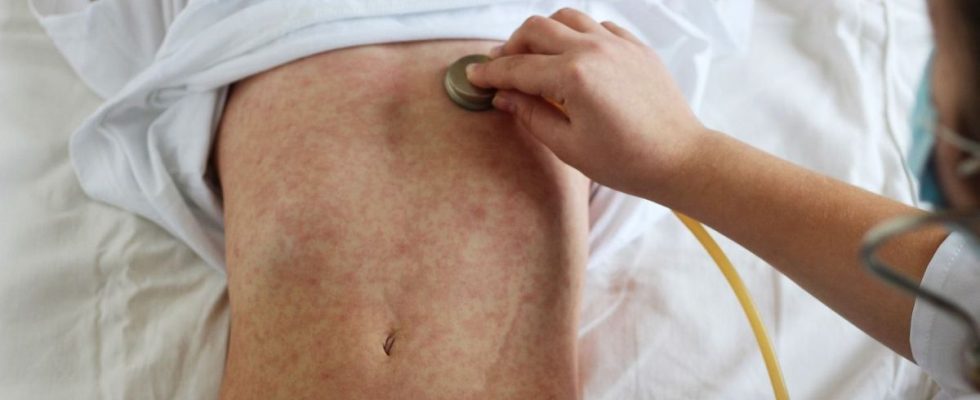Published on
Updated
Reading 3 min.
in collaboration with
Dr Gérald Kierzek (Medical Director of Doctissimo)
Medical validation:
October 21, 2023
In Ardèche, a violent epidemic of measles hit a college: 54 students in total contracted the virus. How to explain such a focus? And what can be done to prevent the spread of the disease? Dr Gérald Kierzek, medical director of Doctissimo, answers you.
It was the Regional Health Agency which sounded the alert. In Ardèche, the Charles de Gaulle college in Guilherand-Granges and three schools in the area are affected by a measles epidemic, with 54 cases recorded.
Measles, a highly contagious disease
In mid-September, the ARS Auvergne-Rhône-Alpes had already been informed of the occurrence of a first case of measles in a student attending Charles de Gaulle college in Guilherand-Granges. But since then, the epidemic has intensified. As of October 13, the Agency recorded nearly 54 cases of measles, distributed between the Charles de Gaulle college in Guilherand-Granges and three primary schools in the area.
“The middle school students concerned are divided into different classes within the same establishment. Some attend several sports clubs in the surrounding Ardèche and Drôme“, specifies the Agency.
If the number of infected students is frightening, it is likely that it will continue to rise: “Lmeasles is very contagious. In the absence of preventive measures, one patient can infect up to 20 people.recalls the ARS in its situation update.
This is why wearing a mask is essential in the event of symptoms (high fever, cough, runny nose, conjunctivitis, fatigue and spots all over the body, editor’s note) to prevent any transmission of the virus.
Measles is caused by a virus that is transmitted by the respiratory tract (coughing, sneezing) or by direct contact (hugs, handshakes). Complications (respiratory or neurological) can occur at any age but are more common in vulnerable people:
- Pregnant women who have not had measles or are not protected by vaccination;
- Children under one year old: they are not yet protected by vaccination;
- People immunocompromised temporarily or permanently due to certain illnesses or treatments.
“An insufficiently vaccinated population”
According to Dr. Kierzek, if such an epidemic outbreak was able to develop, it is due to incomplete vaccination.
“Children at this school should not be vaccinated or, at least, insufficiently vaccinated. When the population is well immunized, we cannot achieve such a number of cases. It is therefore important to remember that the measles vaccine is compulsory for children (1st injection at 12 months and 2nd injection at 16-18 months, editor’s note) and that a single dose is not enough to be protected“. Besides, “it is not just a “childhood” disease, almost half of the cases concern people aged 15 and over. So it’s never too late to get vaccinated!“.
Extremely contagious, measles is a notifiable disease. Health professionals must therefore report cases to the ARS so that it can set up contact tracing (find people who may have been in contact with patients).
Recommendations for parents
The right attitude to follow? The ARS has issued several recommendations to the population, in particular to parents whose children may have been in contact with patients.
Monitor for symptoms
Parents should first of all monitor the health of children and their loved ones.
The incubation of measles (silent phase) lasts between one and three weeks before the first symptoms do not appear: high fever, cough, runny nose, conjunctivitis, fatigue.
Generally, 2 or 3 days later, pimples appear on the skin. First located on the ears and face, the spots then spread quickly, going down the entire body.
In case of symptoms:
- See a doctor promptly,
- Respect barrier gestures: wearing a mask is particularly essential to avoid any transmission of the virus.
Check vaccination status
Parents are also invited to check:
- Vaccination of their child(ren) in the vaccination record
- Their own vaccination if they were born after 1980
In case of non-vaccination or incomplete vaccinationit is right to consult a doctor or pharmacist promptlywith his health record.
As a reminder, The Measles-Mumps-Rubella (MMR) vaccine is administered in 2 doses with PRIORIX or MM-RVAXPRO vaccines.
This vaccination is obligatory for children born since 1er January 2018 (1st injection at 12 months and 2nd injection at 16-18 months). It is recommended for all other people born after 1980.
